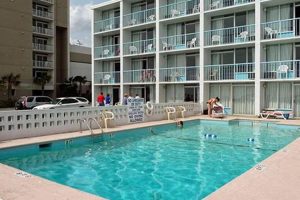An establishment providing lodging near a coastline frequented by surfers, typically offers convenient access to wave breaks and related recreational activities. Such accommodations often feature amenities catering to surfers, such as surfboard storage, rinsing stations, and proximity to surf shops and schools.
These locations play a significant role in coastal tourism, supporting local economies through visitor spending on lodging, dining, and surfing-related services. Historically, they have evolved from simple boarding houses to more sophisticated hotels, adapting to the changing needs and preferences of surfing enthusiasts and vacationers.
The following sections will examine specific aspects of coastal lodging, including design considerations, environmental impact, and the influence of surf culture on hospitality services. Furthermore, factors influencing visitor choice and the challenges facing these businesses will be discussed.
Coastal Lodging Considerations
The following recommendations are for those considering or currently operating a hospitality establishment near a surfing destination, designed to optimize appeal and operational efficiency.
Tip 1: Prioritize Proximity. Location is paramount. Direct or near-direct access to the primary surf break significantly enhances appeal. Conduct thorough site evaluations considering wave quality, swell consistency, and beach accessibility.
Tip 2: Incorporate Surf-Specific Amenities. Design facilities accommodating surfers’ needs. This includes secure surfboard storage, outdoor rinsing stations, and ample drying areas. These features enhance guest experience and reduce potential damage to property.
Tip 3: Emphasize Durability and Ease of Maintenance. Coastal environments are harsh. Utilize durable materials resistant to saltwater corrosion and sand abrasion. Opt for easily cleanable surfaces to minimize cleaning time and maintenance costs.
Tip 4: Cultivate Partnerships. Establish relationships with local surf shops, instructors, and tour operators. Cross-promotion and referral programs can significantly expand reach and attract a wider clientele.
Tip 5: Implement Sustainable Practices. Promote environmental responsibility. Implement water conservation measures, reduce plastic usage, and support local beach cleanup initiatives. Eco-conscious travelers increasingly prioritize establishments demonstrating environmental awareness.
Tip 6: Optimize Online Presence. Ensure a professional and informative website showcasing amenities, location, and customer testimonials. High-quality photography and accurate descriptions are crucial for attracting online bookings.
Tip 7: Foster a Welcoming Atmosphere. Create a relaxed and friendly environment. Train staff to be knowledgeable about local surf conditions and resources. Exceptional customer service fosters loyalty and positive word-of-mouth referrals.
Implementing these considerations will contribute to enhanced guest satisfaction, operational efficiency, and long-term sustainability within the competitive coastal lodging market.
The subsequent sections will delve into marketing strategies and future trends influencing coastal hospitality.
1. Ocean proximity
Ocean proximity is a defining characteristic of establishments catering to surf enthusiasts. This location factor directly influences accessibility, convenience, and the overall value proposition of such lodging facilities.
- Direct Beach Access
Direct access eliminates the need for transportation and maximizes time spent surfing. Examples include establishments with private beach access or immediate adjacency to public beaches. This proximity is a primary determinant for surfers prioritizing convenience and immediate access to waves.
- View Optimization
Oceanfront views enhance the guest experience. Such views provide visual connection to the ocean environment and allow for monitoring of wave conditions. Premium room rates often reflect the value placed on unobstructed ocean vistas.
- Ambient Environment
Proximity influences the ambient environment. The sounds of the ocean and the sea breeze contribute to a relaxing and immersive experience. Establishments situated further inland may lack this sensory connection to the coastal environment.
- Enhanced Coastal Activities
Besides surfing, ocean proximity encourages participation in other coastal activities such as swimming, beachcombing, and sunbathing. This expands the appeal to a broader range of visitors beyond dedicated surfers.
Ocean proximity is inextricably linked to the core identity of establishments catering to surfers. The value proposition is fundamentally tied to the accessibility and immersive experience that close proximity to the ocean provides. These factors collectively influence pricing, occupancy rates, and overall customer satisfaction.
2. Surfboard storage
Surfboard storage is a critical amenity for establishments catering to surfing clientele. The availability and quality of surfboard storage facilities directly impact guest satisfaction, property safety, and operational efficiency.
- Secure Storage Systems
Secure storage mitigates the risk of theft or damage. Options range from individual lockers to communal racks with locking mechanisms. The implementation of surveillance systems further enhances security. Failure to provide adequate security can result in liability issues and damage to the establishment’s reputation.
- Designated Storage Areas
Designated storage areas prevent congestion and potential damage to boards and property. These areas should be strategically located near entrances and exits, minimizing the distance guests must carry their equipment. The absence of dedicated spaces often leads to makeshift storage solutions, increasing the risk of accidents and damage.
- Environmental Protection
Storage facilities should protect surfboards from the elements. Exposure to direct sunlight, excessive heat, and moisture can degrade the materials and shorten the lifespan of the boards. Covered or indoor storage options are essential for maintaining the condition of guest equipment.
- Accessibility and Convenience
Easy access to storage facilities enhances the guest experience. Ramps, wide doorways, and well-lit pathways ensure convenient transport of surfboards, regardless of size or weight. Poorly designed or inaccessible storage areas can deter potential customers and diminish overall satisfaction.
The provision of adequate surfboard storage is not merely a convenience but a fundamental requirement for lodging establishments serving the surfing community. Implementing robust storage solutions demonstrates a commitment to guest satisfaction, property safety, and the specific needs of surfing enthusiasts. These features contribute significantly to the overall appeal and competitiveness of coastal hospitality offerings.
3. Coastal Durability
Coastal durability represents a critical consideration in the design, construction, and maintenance of lodging establishments located near surf beaches. The longevity and operational viability of these facilities depend heavily on their ability to withstand the unique environmental challenges presented by coastal conditions.
- Material Selection and Corrosion Resistance
The selection of building materials is paramount. Coastal environments are characterized by high humidity, saltwater spray, and strong winds, all of which accelerate corrosion. Materials such as stainless steel, marine-grade aluminum, and treated lumber are essential for structural components and exterior finishes. Improper material selection leads to premature degradation, increased maintenance costs, and potential safety hazards.
- Structural Engineering and Wind Resistance
Coastal buildings must be engineered to withstand extreme wind events and potential storm surges. This requires robust structural design, reinforced foundations, and adherence to stringent building codes. Features such as impact-resistant windows and reinforced roofing systems are critical for minimizing damage during severe weather. Inadequate structural integrity compromises safety and increases the risk of catastrophic failure.
- Erosion Control and Landscaping
Coastal erosion poses a significant threat to waterfront properties. Implementing effective erosion control measures, such as seawalls, riprap, and dune stabilization, is crucial for protecting the foundation and surrounding landscape. Careful landscaping with native, salt-tolerant species further contributes to soil stabilization and reduces the impact of wave action. Neglecting erosion control results in land loss, property damage, and environmental degradation.
- Moisture Management and Mold Prevention
High humidity and saltwater intrusion create ideal conditions for mold growth. Proper ventilation, moisture barriers, and mold-resistant building materials are essential for preventing the proliferation of mold and mildew. Regular inspections and prompt remediation of water damage are critical for maintaining indoor air quality and preventing health problems. Uncontrolled mold growth leads to structural damage, health hazards, and decreased property value.
Coastal durability is not merely an aesthetic consideration but a fundamental aspect of responsible ownership for any lodging establishment situated near a surf beach. Investing in durable materials, robust construction, and proactive maintenance strategies is essential for ensuring the long-term viability and safety of these properties in the face of persistent environmental challenges.
4. Local partnerships
Local partnerships constitute a strategic imperative for lodging establishments situated near surf beaches. These collaborations foster economic symbiosis, enhance guest experiences, and contribute to the overall vitality of the surrounding community.
- Surf Schools and Instruction Providers
Collaborations with local surf schools and instructors offer guests convenient access to professional instruction. Referral programs and bundled packages provide mutual benefit, driving business to both the lodging establishment and the surf school. Such partnerships enhance the value proposition for guests seeking to learn or improve their surfing skills, and can provide certified instructors for group events.
- Surf Shops and Equipment Suppliers
Partnerships with local surf shops ensure guests have access to high-quality equipment rentals and purchases. Lodging establishments can offer exclusive discounts or facilitate equipment delivery, enhancing convenience for guests. These collaborations support local businesses and provide guests with access to expert advice on equipment selection and maintenance. Example is discounts code and free shipping.
- Restaurants and Food Service Providers
Collaborations with local restaurants and food service providers offer guests diverse dining options and promote local cuisine. Lodging establishments can offer package deals including meals, recommend local restaurants, or host special culinary events. These partnerships expose guests to the culinary offerings of the region, support local businesses, and generate revenue for both parties.
- Tourism Operators and Activity Providers
Partnerships with local tourism operators and activity providers expand the range of activities available to guests beyond surfing. These collaborations can include tours of local attractions, kayaking excursions, or fishing trips. By offering a diverse range of activities, lodging establishments can attract a broader clientele and enhance the overall guest experience while supporting the local economy.
These synergistic relationships enhance the appeal and competitiveness of lodging establishments near surf beaches. Strategic collaboration fosters a thriving ecosystem of local businesses, enriching the guest experience and contributing to the economic well-being of the surrounding community. Supporting businesses such as the local coffee shops creates a more complete guest experience.
5. Sustainable practices
Sustainable practices are increasingly vital to the long-term viability and ethical operation of lodging establishments, particularly those situated in sensitive coastal environments such as surf beaches. Implementing sustainable measures not only mitigates environmental impact but also enhances brand reputation and attracts environmentally conscious travelers.
- Water Conservation Strategies
Water conservation is paramount in coastal regions often facing water scarcity. Implementing low-flow showerheads and toilets, promoting linen reuse programs, and utilizing drought-resistant landscaping are effective strategies. Real-world examples include the installation of rainwater harvesting systems for irrigation and the use of greywater recycling for non-potable applications. Reduced water consumption lowers operational costs and minimizes the strain on local water resources, aligning with responsible environmental stewardship.
- Energy Efficiency Initiatives
Reducing energy consumption lowers carbon footprint and operational expenses. Employing energy-efficient lighting, appliances, and HVAC systems is fundamental. Solar panel installations provide a renewable energy source, reducing reliance on fossil fuels. Implementing smart thermostats and energy management systems optimizes energy usage based on occupancy patterns. This enhances environmental responsibility and appeal to customers seeking environmentally conscious hospitality choices.
- Waste Reduction and Recycling Programs
Effective waste reduction and recycling programs minimize landfill waste and promote resource conservation. Implementing comprehensive recycling programs for paper, plastic, and glass is essential. Reducing single-use plastics through the use of reusable containers and amenities minimizes environmental pollution. Composting food waste reduces landfill burden and creates valuable fertilizer. These measures demonstrate a commitment to environmental sustainability and reduce operational costs associated with waste disposal.
- Responsible Sourcing and Procurement
Sourcing sustainable and locally produced goods minimizes environmental impact and supports local economies. Prioritizing suppliers with eco-friendly practices, purchasing organic and locally sourced food, and using sustainable building materials reduces the carbon footprint associated with procurement. Offering locally crafted products in gift shops promotes local artisans and enhances the guest experience. This supports local communities and ensures that products and materials have minimal environmental consequence.
Incorporating these sustainable practices is critical for coastal lodging establishments to mitigate their environmental impact, reduce operational costs, and enhance their brand reputation. Embracing sustainability aligns with evolving consumer preferences and contributes to the long-term health of the coastal environment, ensuring the continued enjoyment of these natural resources for future generations.
Frequently Asked Questions
The following section addresses common inquiries regarding coastal lodging establishments situated near surf beaches. The aim is to provide clarity and comprehensive information for prospective guests and stakeholders.
Question 1: What constitutes a coastal lodging establishment appropriate for surfing enthusiasts?
Establishments near surf beaches typically offer proximity to surfing locations and amenities catering to surfers, such as board storage and rinse stations.
Question 2: Is advance booking necessary at establishments near surf beaches?
Advance booking is generally recommended, especially during peak surfing seasons and holiday periods, to ensure availability.
Question 3: What security measures are in place to protect surfboards at coastal lodging establishments?
Many establishments offer secure surfboard storage options, including locked lockers or designated storage areas under surveillance.
Question 4: Are there dining options available at or near these lodging establishments?
A variety of dining options are typically available, either on-site or within walking distance, ranging from casual eateries to fine dining restaurants. Partnering with local restaurants and food service providers offer guests diverse dining options.
Question 5: Are sustainable practices implemented at coastal lodging establishments?
Many establishments are implementing sustainable practices, such as water conservation measures, energy-efficient technologies, and waste reduction programs.
Question 6: How does the establishment contribute to local economic growth?
These types of establishments contribute to local economic growth through visitor spending, support for local businesses, and job creation within the community. Partnerships with local tourism operators and activity providers expand activities and provide additional access for guests.
These FAQs provide a snapshot of common inquiries. Potential guests are encouraged to contact the establishment directly for specific information.
The subsequent sections will delve into case studies.
Conclusion
This exploration has illuminated key facets associated with establishments near surf beaches. Proximity to the ocean, specialized amenities like surfboard storage, attention to coastal durability, local partnerships, and a commitment to sustainable practices constitute core tenets of successful operation. The absence or inadequacy of these elements can demonstrably detract from visitor experience and long-term viability.
The ongoing evolution of coastal tourism necessitates a proactive and informed approach. Continued investment in resilient infrastructure, environmentally conscious operations, and mutually beneficial community relationships is paramount to ensuring the enduring prosperity of these establishments and the preservation of the coastal environments they occupy.


![Your Sunset Beach Surf Forecast: [Conditions & More] Learn to Surf & Skate: A Beginner's Step-by-Step Guide Your Sunset Beach Surf Forecast: [Conditions & More] | Learn to Surf & Skate: A Beginner's Step-by-Step Guide](https://universitysurfandskate.com/wp-content/uploads/2026/01/th-856-300x200.jpg)




